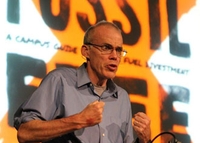Challenging the prevailing wisdom that the goal of economies should be unlimited growth, McKibben (The End of Nature
) argues that the world doesn't have enough natural resources to sustain endless economic expansion. For example, if the Chinese owned cars in the same numbers as Americans, there would be 1.1 billion more vehicles on the road—untenable in a world that is rapidly running out of oil and clean air. Drawing the phrase "deep economy" from the expression "deep ecology," a term environmentalists use to signify new ways of thinking about the environment, he suggests we need to explore new economic ideas. Rather then promoting accelerated cycles of economic expansion—a mindset that has brought the world to the brink of environmental disaster—we should concentrate on creating localized economies: community-scale power systems instead of huge centralized power plants; cohousing communities instead of sprawling suburbs. He gives examples of promising ventures of this type, such as a community-supported farm in Vermont and a community biosphere reserve, or large national park–like area, in Himalayan India, but some of the ideas—local currencies as supplements to national money, for example—seem overly optimistic. Nevertheless, McKibben's proposals for new, less growth-centered ways of thinking about economics are intriguing, and offer hope that change is possible. (Mar. 20)


